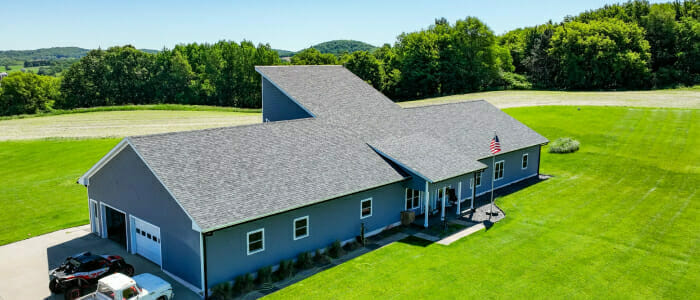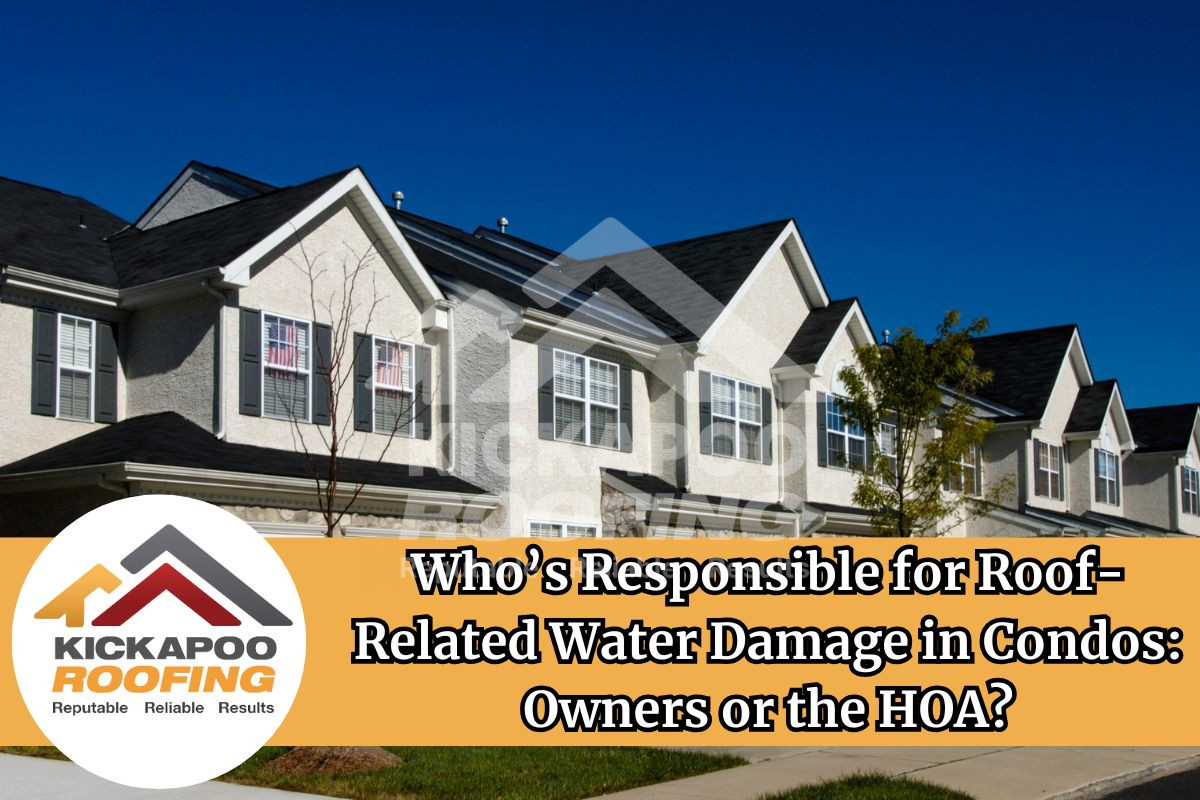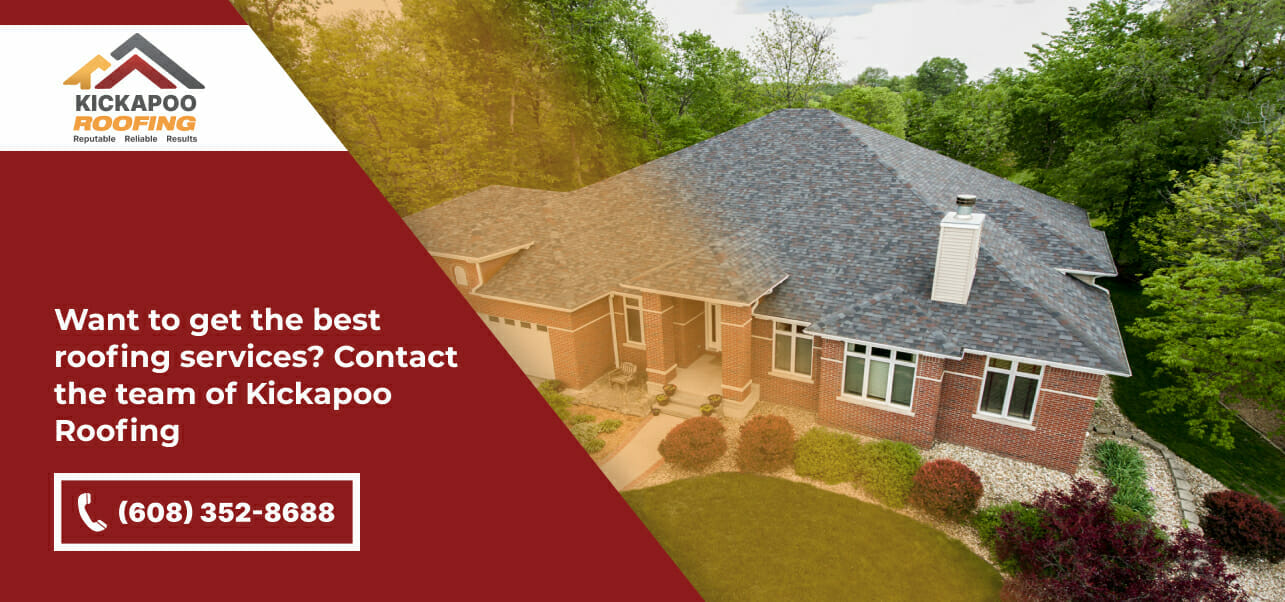Water damage from roof issues in condominiums can be a complex and frustrating problem. When faced with a leaky ceiling or water-stained walls, condo owners often wonder: Who’s responsible for the repairs? Is it the individual owner or the homeowners association (HOA)? Generally, the HOA covers roof-related water damage. However, if the problem is due to a lack of maintenance or personal negligence, then the condo owner is responsible.
This complete guide will cover this common yet confusing issue of condo water damage from the roof. After reading this five-minute guide, you will easily determine whether the problem in your condominium is covered under your HOA policy or not.
Understanding Water Damage in Condos
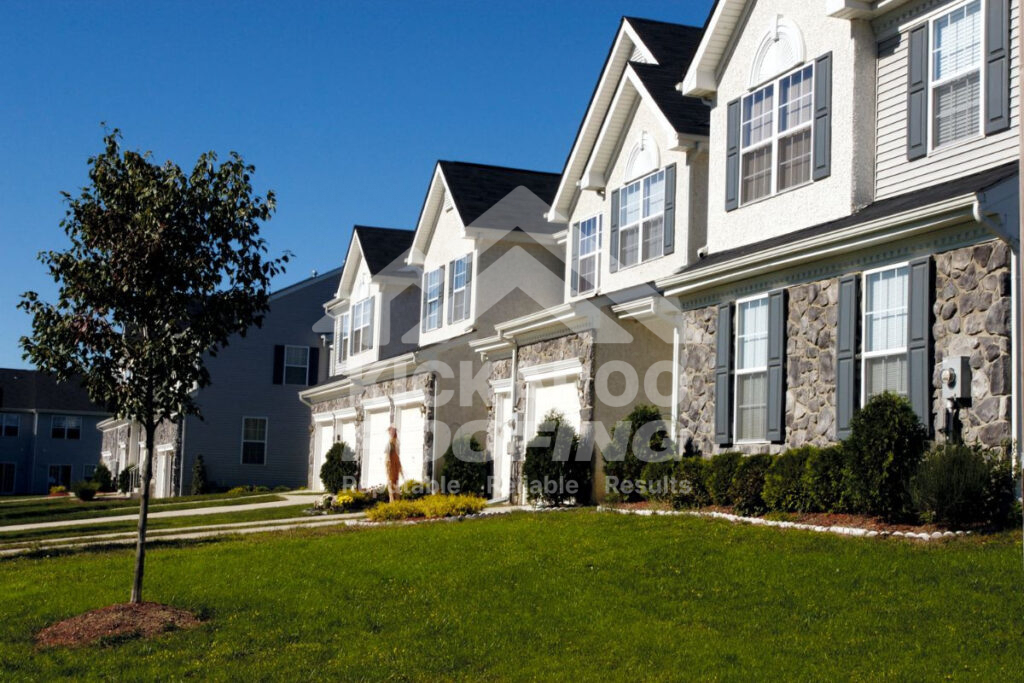
Water damage in condos can occur for various reasons, but roof-related problems are among the most common. According to the Insurance Information Institute (III), water damage and freezing issues were the second most common cause of homeowners insurance claims between 2014 and 2018, with an average claim cost of $10,849. While this statistic isn’t specific to condos, it highlights the frequency of water damage incidents and their potential costs.
Common causes of water damage from roofs in condos include:
👉 Roof leaks because of aging or poor maintenance
👉 Improper roof installation
👉 Faulty gutters or downspouts
👉 Weather-related incidents like heavy rain or snow
This type of damage generally manifests as water stains on ceilings or walls, peeling paint, or even structural instability if left unchecked. When these issues arise, condo roof leak repair becomes an urgent concern.
What Is The Role of Homeowners Associations (HOA)?
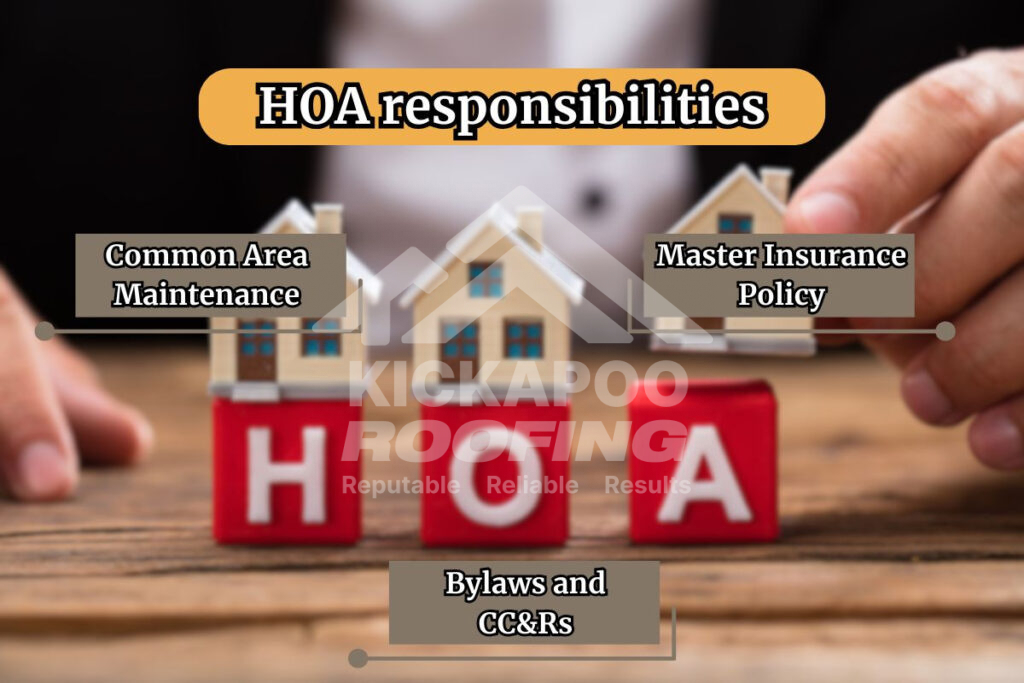
When it comes to condo roof leak repair, the HOA often plays an important role. Generally, HOAs are responsible for maintaining and repairing common areas of the condominium complex, which usually includes the roof.
Here’s what you need to know about HOA responsibilities:
1. Common Area Maintenance
The HOA is generally responsible for maintaining and repairing shared structures, including the roof, exterior walls, and common hallways.
2. Master Insurance Policy
Most HOAs carry a master insurance policy that covers damage to common areas. This policy may also extend to certain aspects of individual units.
3. Bylaws and CC&Rs
The specific responsibilities of the HOA are outlined in the association’s bylaws and Covenants, Conditions & Restrictions (CC&Rs). These documents detail what the HOA covers and what falls to individual owners.
A common question people have is: “Is the condo association responsible for a roof leak?” The answer largely depends on the specific bylaws of your HOA, so it’s very important to review these documents carefully.
What Are The Responsibilities Of The Owner?
While the HOA often covers issues with shared structures, individual condo owners are generally responsible for repairing and maintaining the interior of their units. This includes:
1. Interior Repairs
The owner is usually responsible for damage to walls, floors, and fixtures within the unit. This might include the cost of repairing water-damaged drywall in condo interiors.
2. Individual Insurance
Condo owners should have their own insurance policy to cover their unit’s interior and personal property. Any damage to furniture, electronics, or other belongings is generally covered by the owner’s personal condo insurance policy, not the HOA’s master policy. In case of damage, you may need to file a condo roof leak insurance claim.
As per the NAIC (National Association of Insurance Commissioners), condo owners are responsible for insuring their own units. This means if a water leak causes damage to an individual condo, it’s generally the owner’s responsibility, not the HOA’s.
How to Determine if Existing Water Damage in Your Condo is Covered by the HOA
Determining who’s responsible for covering water damage on the ceiling in your condo isn’t always straightforward:
1. Source of the Leak
The origin of the water damage is important in determining responsibility. The HOA may be liable if the damage stems from a common area (like the roof). If it’s from within the unit (like a burst pipe), it’s likely the owner’s responsibility.
2. HOA Bylaws and CC&Rs
As previously mentioned, these documents often specify which party is responsible for different types of repairs.
3. State Laws
Some states have laws that affect how responsibility is determined in these situations.
4. Insurance Policies
Both the HOA’s master policy and the individual owner’s policy often play a role in covering damages.
Understanding who pays for what in a condominium water leak situation can be complex, so it’s often helpful to consult with a legal professional or your insurance provider for clarity.
Steps to Take After Encountering Roof-Related Water Damage In Your Condo
If you are experiencing any sudden roof-related water damage in your condo, here are the steps you should take:
👉 Prevent Further Damage: Take immediate action to prevent additional damage, such as placing buckets under leaks or moving valuables.
👉 Document the Damage: Take photos, videos, and records of the damage for insurance purposes.
👉 Check your HOA Insurance Policy: Check if the existing problem you are facing is covered under your insurance policy. Carefully review your HOA’s bylaws and CC&Rs to understand your rights and responsibilities.
👉 Notify the HOA: Report the issue to your HOA immediately, especially if you suspect the source is from a common area.
👉 Contact Your Insurance Company: Notify your personal condo insurance provider about the damage.
👉 Get a Professional Assessment: Have a professional assess the damage and provide an estimate for condo roof leak repairs.
👉 Keep Records: Make sure that you maintain detailed records of all communications, assessments, and repair work related to the incident.
What If The HOA Refuses To Take Responsibility For Roof-Related Water Damage?
If your HOA denies responsibility despite evidence suggesting they should cover the damage, don’t give up. Thoroughly re-examine your governing documents (CC&Rs and bylaws) and other relevant communication with the HOA. Once you have the relevant proof, here are some next steps to follow:
1. Mediation: Many HOAs have dispute resolution procedures that involve mediation. This can help both parties reach an agreement without going to court.
2. Legal Action: If mediation fails, you may need to consult with an attorney specializing in real estate or HOA law to explore legal options.
3. Insurance Claim: As a last resort, file a claim with your own insurance company. They may cover the damage and then subrogate (seek reimbursement) from the HOA’s insurance.
You Might Also Like: The Essential Checklist For A Hassle-Free Condo Roof Replacement
We Provide Professional Roofing Services To HOA’s In La Crosse, WI
Kickapoo Roofing offers expert roofing services to homeowners associations in La Crosse and the surrounding areas in Wisconsin. Our experienced team has been serving the local community for years, providing reliable roof repair and replacement for HOAs, single-family homes, and commercial properties.
We begin with a thorough roof inspection, offering a detailed analysis of your roof’s condition and any urgent concerns. For professional roofing services tailored to your HOA’s needs, contact Kickapoo Roofing at (608) 352-8688.
A. If a neighbor’s actions cause water damage to your unit, their liability insurance may be responsible for the repairs. Report this incident to the HOA, as this creates an official record of the event.
Then, discuss the issue with your neighbor and see if they will cover the damage. If your neighbor is uninsured, your own insurance may cover the damage, and then you may pursue reimbursement from the neighbor.
A. This depends on your specific policy and the HOA’s master policy. Review your policy carefully to understand the following:
- Coverage limits: How much will your policy pay for water damage repairs?
- Deductibles: The amount you’ll have to pay out-of-pocket before your insurance kicks in.
- Exclusions: Any specific situations or types of damage that are not covered.
 (608) 352-8688
(608) 352-8688  schedule consultation
schedule consultation
